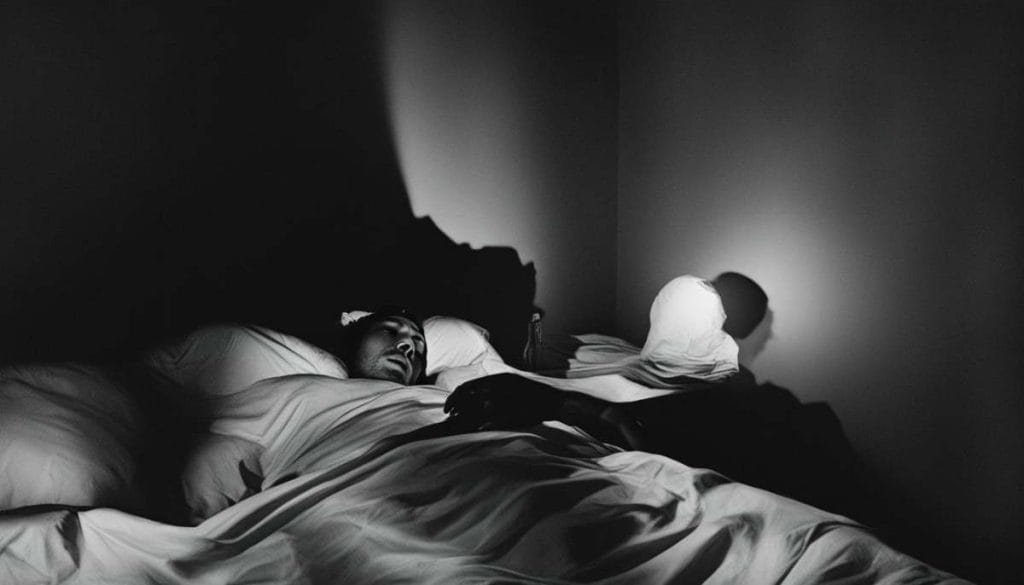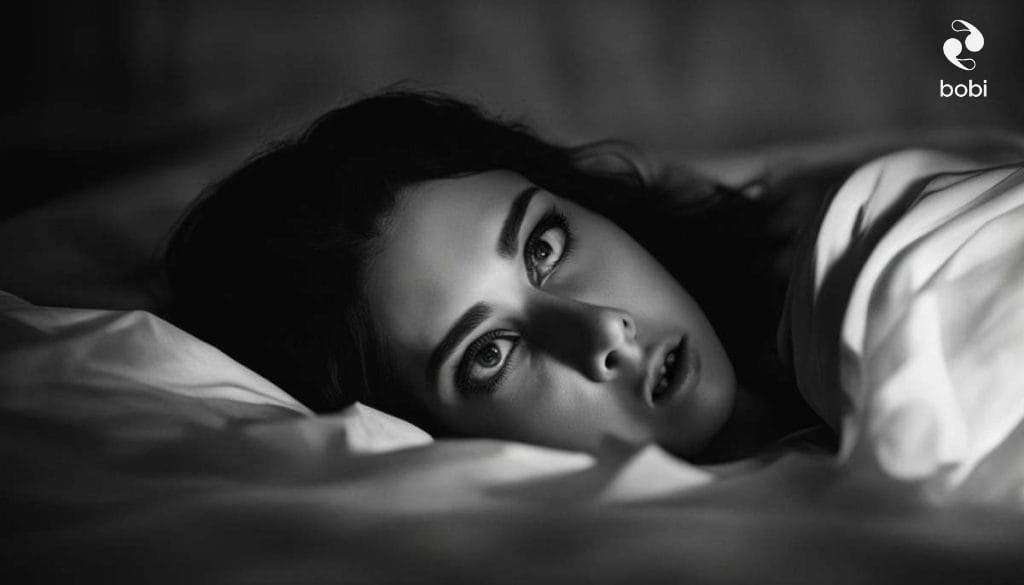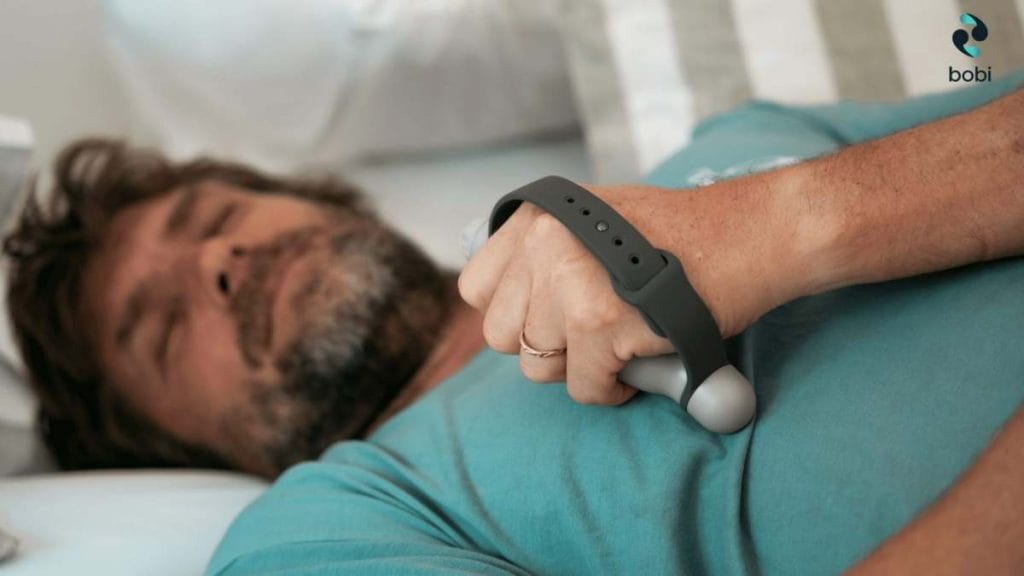
In my psychology clinic, I often hear people describe waking up in the middle of the night with panic attack symptoms. It’s quite prevalent, with estimates suggesting that a significant percentage of people experience panic attacks at night. These nocturnal attacks can be overwhelming and disruptive, affecting one’s ability to have a good night’s sleep.
People may confuse the panic attack symptoms with sleep disorders like sleep apnea or night terrors, as they can share similar symptoms. The strong emotions and physical sensations that accompany panic attacks can be alarming, leading to increased anxiety and even insomnia. I’ll clarify in this blog what a nocturnal panic attack is, the symptoms, causes and risk factors, triggers, and then how to manage them as per the advice I give my patients with ‘bobi‘ _ a tool designed to stop panic attacks instantly.
Nocturnal panic attacks, also known as symptoms of a panic attack at night, are episodes of intense fear and physical symptoms that occur during sleep. These attacks can be a result of anxiety disorders or traumatic events. Sleep apnea, insomnia, and night terrors can also contribute to the occurrence of nocturnal panic attacks.
People experiencing these attacks may have symptoms similar to those of a panic attack during the day, such as a rapid heart rate, difficulty breathing, and feelings of impending doom. Understanding the causes and risk factors of nocturnal panic attacks is essential to effectively manage and stop panic attacks instantly.
Symptoms of panic attacks at night can be both physical and psychological. It’s important to understand the differences between physical and physiological symptoms as they both have slightly different treatment options available.

During a panic attack at night, physical symptoms can be intense and may mimic those of a heart attack or other medical emergency. These symptoms may include a rapid heart rate, chest pain, a feeling of choking, sweating, trembling, and lightheadedness. It’s important to understand these physical symptoms to distinguish them from other health conditions.
By recognizing the signs of nocturnal panic attacks, individuals can seek appropriate treatment and differentiate between panic attack symptoms and other sleep-related disorders like sleep apnea or night terrors. A good night’s sleep is crucial for overall well-being. Moreover, you can improve sleep quality by addressing these physical symptoms of panic attacks.
The symptoms are not just physical rather anyone with a nocturnal panic attack suffers from various psychological symptoms. These can include an overwhelming sense of fear, a feeling of near death, or a loss of control. It is not uncommon for those experiencing these attacks to have a strong desire to escape the situation they find themselves in.
Additionally, they may feel detached from reality, agitated, or confused. Recognizing these psychological symptoms is crucial in seeking the appropriate treatment. By understanding and identifying these symptoms, individuals can take the necessary steps toward managing and overcoming nocturnal panic attacks.
Nocturnal panic attacks can be a perplexing and distressing experience, leaving individuals wondering why they occur during sleep. While the exact cause of panic attacks at night is unknown, several factors can contribute to their occurrence. These factors include:
In addition to these factors, certain physical illnesses, lack of assertiveness, and significant life changes can also cause symptoms of a panic attack at night. Understanding the potential triggers and underlying factors can help manage and prevent these episodes.
Night-time panic attacks can be triggered by a multitude of factors. Stressful situations, such as a high-pressure job or a difficult relationship, can contribute to the onset of a nocturnal panic attack. Traumatic events, such as a car accident or a natural disaster, can also be a trigger for night-time panic attacks. A lack of sleep and irregular sleep patterns can disrupt the body’s natural rhythms and contribute to the development of nocturnal panic attacks.
Furthermore, phobias, agoraphobia, and anxiety disorders can all play a role in triggering night-time panic attacks. By understanding the various triggers for nocturnal panic attacks, individuals who experience these symptoms can take steps to manage their condition and reduce the frequency and severity of their panic attacks.
According to recent studies, individuals with panic disorder, anxiety disorders, or a history of traumatic events are more susceptible to experiencing nocturnal panic attacks. This is particularly true for those who already experience daytime panic attacks.
Research has shown that up to 30% of individuals with panic disorder experience nocturnal panic attacks.
Additionally, women are more likely than men to have night-time panic attacks. It has also been found that individuals who suffer from various medical conditions like asthma, sleep apnea, and heart disease are also prone to experiencing panic attacks at night. Moreover, those who consume excessive caffeine or alcohol, or use recreational drugs, are more likely to have panic attacks during sleep. Stressful life events, such as the loss of a loved one or a job, can also trigger a nocturnal panic attack.
Managing and preventing nocturnal panic attacks can involve a combination of therapy, medication, and lifestyle changes, or sometimes only one of the three. Cognitive behavioral therapy (CBT) can help identify and challenge negative thought patterns and beliefs that contribute to panic attacks at night. Medications like selective serotonin reuptake inhibitors (SSRIs) or benzodiazepines may be prescribed to reduce the frequency and intensity of nocturnal panic attacks.
Creating a bedtime routine, practicing relaxation techniques, and ensuring a healthy sleep environment can aid in prevention. Seeking guidance from a mental health professional can provide a personalized treatment plan. Remember, managing nocturnal panic attacks is possible with the right methods and support.
Whilst medication can help, I advocate for my patients a natural first approach where possible. Here is what I advocate first up on how to handle symptoms of a panic attack at night:
Remember, everyone’s experience with panic attacks is unique, so it may take some trial and error to find the strategies that work best for you. If you find that your panic attacks at night are becoming more frequent or interfering with your daily life, don’t hesitate to seek professional help. A healthcare professional can provide a proper diagnosis and guide you toward effective treatment options

While complete elimination of nocturnal panic attacks may not be guaranteed, significant progress can be achieved in managing and reducing their occurrence. With the appropriate treatment, lifestyle changes, and coping strategies, individuals can significantly reduce the frequency and intensity of these attacks. Therapy, medication, and other interventions empower individuals in their journey to overcome nocturnal panic attacks.
By utilizing tools such as bobi to help alleviate the symptoms of anxiety and panic attacks. Moreover, you can minimize the symptoms of a panic attack at night by adopting healthy sleep habits including slow controlled breathing before bed. Remember, managing a nocturnal panic attack is possible with bobi. So get your bobi from here to overcome these attacks completely.
Nocturnal panic attacks can be a challenging experience, but relief and improved sleep quality are attainable with the right treatment, therapy, and lifestyle changes. Seeking professional help and adopting a comprehensive approach empower individuals to overcome these attacks.
So, integrate bobi into your daily routine to get rid of panic attack symptoms and live a happy healthy life.
Nocturnal panic attacks, also known as panic attack symptoms at night, are intense episodes of fear and physical symptoms that occur during sleep. They can be a result of anxiety disorders, traumatic events, or other factors like sleep apnea and insomnia.
Night-time panic attacks are more common than many people realize. They can affect individuals with panic disorder, anxiety disorders, and even those without a diagnosed mental health condition. The lack of sleep caused by these attacks can worsen daytime panic and anxiety symptoms.
Symptoms can include a racing heart, chest pain, difficulty breathing, intense fear, a sense of impending doom, and a feeling of being out of control. These symptoms are similar to daytime panic attacks but occur during sleep.
They can be triggered by various factors including anxiety disorders, traumatic events, stressful situations, substance use disorders, and certain medical conditions like thyroid problems.
Management involves a combination of therapy, medication, and lifestyle changes. Cognitive behavioral therapy (CBT), medications like SSRIs, practicing relaxation techniques, and maintaining a healthy sleep routine can help reduce the frequency of these attacks
Stay updated on what's happening at bobi, and all things breathing, anxiety and mental wellness.